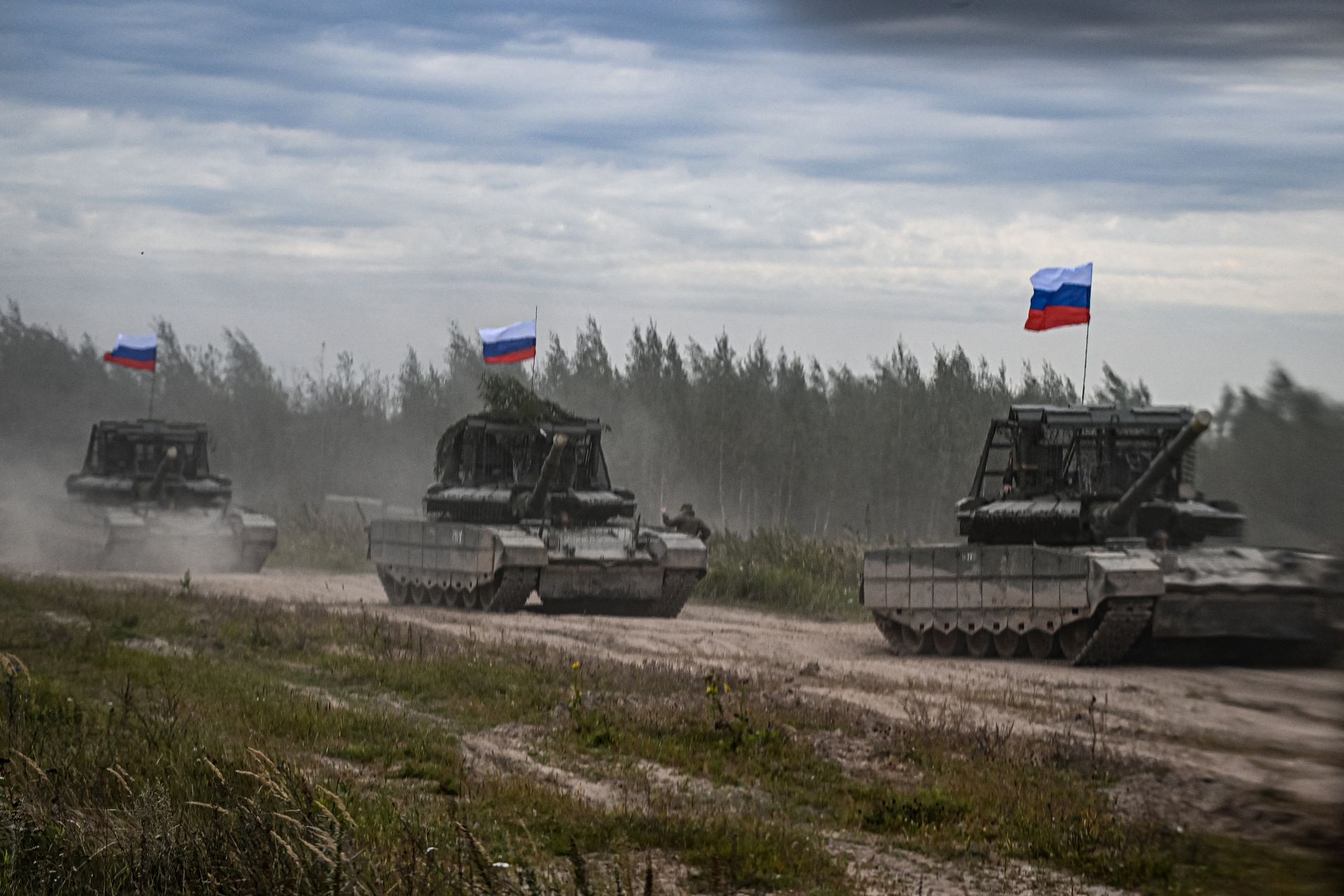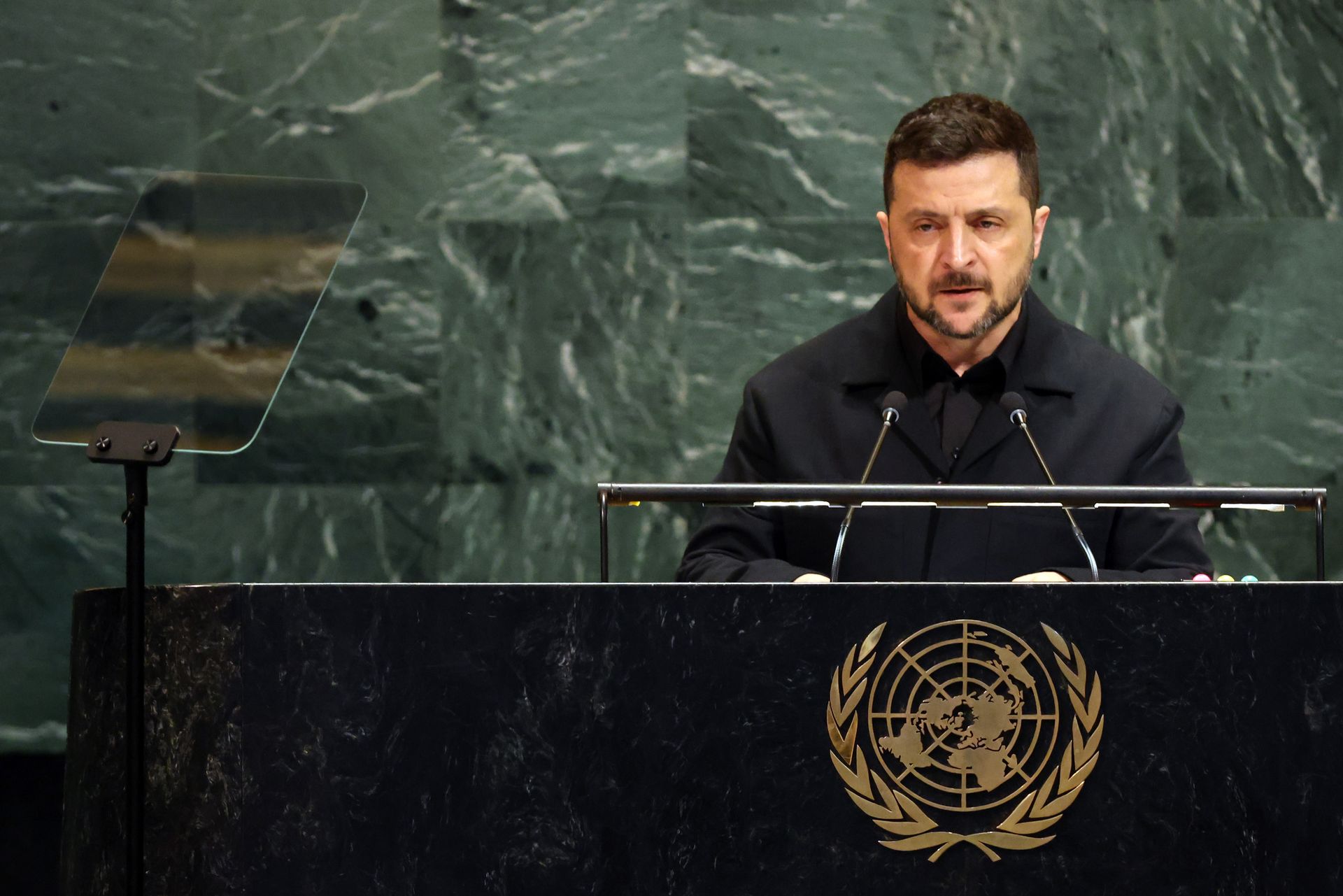Russia targets Moldova’s future as voters head to the polls

Patriotic Block (BEP) party rally in Chișinău, Moldova, on Sept. 25, 2025, ahead of the parliamentary elections on Sept. 28. (Daniel Mihailescu / AFP via Getty Images)
CHIȘINǍU, Moldova — Russian-controlled politicians, troll farms, cyberattacks, vote-buying, and coordinated violence… As Moldovans will head to the polls this Sunday, Russia has doubled down on its longstanding aim — to gain hold of the country of 2.6 million.
The ruling pro-European PAS party, founded by President Maia Sandu, is likely to come first with around 30-40 percent, according to a number of polls.
It may fall just short of a parliamentary majority.
The main opposition, the Kremlin-aligned Patriotic Bloc, is aiming at around 13-20 percent of the votes.
The bloc unites the country's Socialist and Communist parties and is led by a flurry of former top officials — ex-President Igor Dodon, ex-President Vladimir Voronin, former Prime Minister Vasile Tarlev, and the former governor of the southern autonomous region Gagauzia, Irina Vlah, recently sanctioned by Canada and Ukraine.
Despite the Kremlin-aligned bloc lacking the capacity to outright win the election, it's who comes in third and potentially fourth place that will count.
Eyeing third place is Renato Usatîi's populist Our Party with an estimated 5-10 percent of the votes. The former mayor of the northern town of Bălți, Usatîi, gained a fortune through business dealings with the Russian state railways.
Using vivid, vulgar speech, Usatîi often makes headlines by sharing information few have access to, but which does not always prove right. He boycotted Moldova's EU membership constitutional referendum last autumn, which passed with a 50.33 percent margin, or 10,000 votes.
Usatîi's third-place competitor is the newly created Alternative Bloc.


Declaring themselves pro-European, the Alternative Bloc is led by Chișinău's Mayor Ion Ceban, banned by Romania from entering the Schengen Area for security reasons. Other party leaders include Voronin's former advisor Mark Tkaciuc, Dodon's former Prime Minister Ion Chicu, who also boycotted Moldova's EU referendum, and the former Prosecutor General Aleksandr Stoianoglo, who competed against Maia Sandu in the country's 2024 presidential elections, and gained 44.65 percent of the vote. Stoianoglo was supported by the Russian-financed vote-buying scheme.
"They do not believe in Russia. They do not believe in Europe. They believe only in money."
Unlike individual parties, which require five percent to pass the threshold, blocs would be required to gain at least seven percent of the popular vote to enter parliament, a number that the Alternative Bloc is just short of, according to polls.
The bloc has also printed stamped ballot papers, an illegal act according to the Central Electoral Commission. While the Alternative said this was done for publicity reasons, the police accused them of trying to implement the "carousel" vote fraud scheme, whereby one person enters the polling station with a filled ballot paper, dropping it in the box, and takes out an empty one, handing it to the next person.
Days before the election, around 20 to 30 percent of the population remain undecided on whom to support. According to sociologist Vadim Pistrinciuc, these people may have both pro-European views in largely pro-Russian areas like Gagauzia and keep quiet, or be among those who were open to receiving money for their votes in the past.
On Sept. 22, President Sandu gave a national address, in which she warned that "the Kremlin is pouring hundreds of millions of euros to buy hundreds of thousands of votes on both banks of the Dniester (Nistru) River and abroad. People are intoxicated daily with lies. Hundreds of individuals are paid to provoke disorder, violence, and spread fear."
According to Sandu, the Kremlin's local accomplices are not ideologically driven. "They do not believe in Russia. They do not believe in Europe. They believe only in money," Sandu said.
On the same day, Moldovan police, intelligence, and prosecution held a joint press conference, where they announced they arrested 74 people, confiscating weapons and munitions.

The detainees were part of the network coordinated by Ilan Shor, the Moldovan oligarch who fled the country prior to being charged for fraud. Shor is believed to reside in Moscow.
More than 100 people have been trained by Russia's GRU officers in Serbia to organise mass violence, Moldova's Security and Intelligence Service Chief Alexandru Musteta said.
Law enforcement conducted hundreds of searches across the country, confiscating the equivalent of over five million euros.
"We are not talking about hybrid warfare any longer but a multidimensional war tested in a relatively small and not very rich country whose capacity cannot compare to Russia," Pistrinciuc from the Moldovan think-tank IPIS told the Kyiv Independent.
According to him, these intensive attacks aim not only to block Moldova's EU integration process but also to "destroy Moldova as an (independent) state."
"If a foreign power can hijack a third to half of the votes, we are no longer talking about a state. Moldova is one of the few post-Soviet states in which elections have mattered. They are the stepping stones of the Republic of Moldova. Russia wants to prove that our institutions are not strong enough and our citizens not vigilant enough."
While cleavages between citizens with different views have grown, Moldovans have proven to be resilient so far, according to Pistrinciuc.
Part of the resilience has come from investigative journalists. Several undercover investigations from national and local media platforms such as Ziarul de Gardă, NordNews, CuSens, but also the BBC, have infiltrated Russian troll farms in Moldova and shown their inner workings.
The farms' declared purpose is to instill fear and panic, Russian-linked coordinators admitted on camera.
Hundreds of Moldovans were thus trained and paid to spread anti-EU, anti-government, Kremlin-aligned narratives via online content, as well as manipulative opinion polls done over the phone.
According to the Atlantic Council's Digital Forensic Research Lab, until Sept. 18, these networks produced just under 30,000 posts gaining more than 55 million views.
"The Russian propaganda machine is more disciplined," journalist Dumitru Pelin from the Moldovan platform NordNews told the Kyiv Independent.
"What we cut out of our investigation is that Russians made a very detailed feasibility study about the incomes people have, the attention they lack," he added
The northern region, where Pelin lives and works, has been particularly targeted by Russian propaganda, he said. Meanwhile, according to the journalist, "central authorities, busy with governing the country, communicated more sporadically with these citizens."
"We also have the ethnic vote," Pelin added, referring to the fact that according to opinion polls, ethnic minorities in Moldova tend to speak Russian — a Soviet-era heritage — and share Kremlin narratives.
A large part of the country's population knows Russian as a primary or secondary language. Pelin himself comes from a mixed family: his mother is Ukrainian, and his father is Romanian Moldovan. They spoke Russian at home, but Pelin attended a Romanian language school. He said his case is not unique: more and more Russian speakers send their children to Romanian language schools.

"This region is slowly changing into a pro-European area," Pelin added. "We need to work with poorly informed citizens."
Another key voting group in the upcoming parliamentary elections is Moldova's one-million-people-strong diaspora, one of Russia's primary targets.
Until now, the diaspora has overwhelmingly voted for pro-European candidates and parties. But in recent months, advertorials on social media promised Moldovans abroad between 250 and 400 euros for "event management" and observing elections; the money would be given in cash, and one requirement is to know the "Moldovan" language, the Soviet way of calling the Romanian language spoken in Moldova.
This shows that Russia's network "is also extensive in European countries," Pistrinciuc said.
Another country closely watching the upcoming elections in Moldova is Ukraine.
Russia has long controlled Transnistria, a breakaway region on Moldova's eastern border with Ukraine. Experts say Moscow is also eyeing taking political control of Chisinau.
Russia's control over Moldova's government "would open new opportunities to destabilise southern Ukraine," Pistrinciuc added.
"The volume of resources thrown into this process shows that Russia sees these elections as a historic battle for the future of Moldova," he added. "The equation is simple: the better-off Moldovans are, the more they distance themselves from the past Russian influence."











